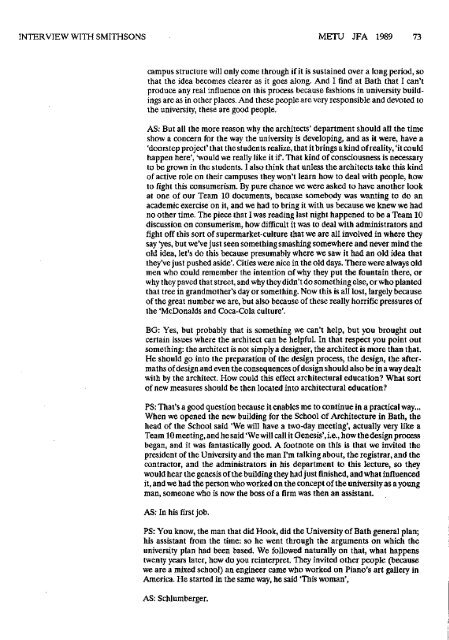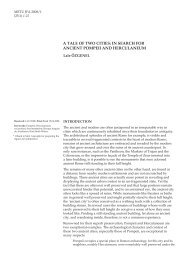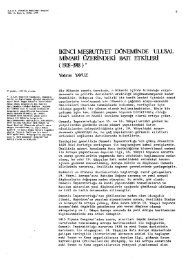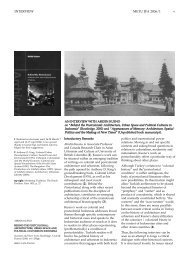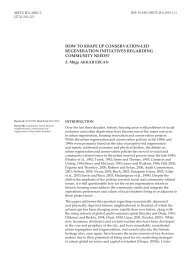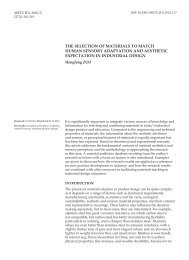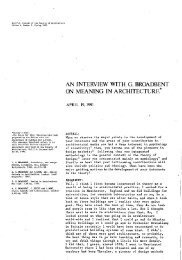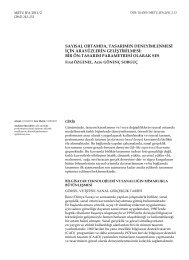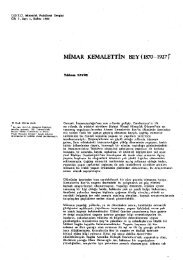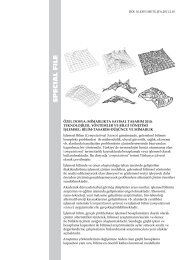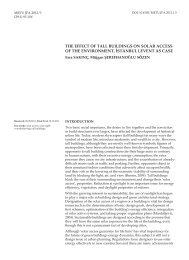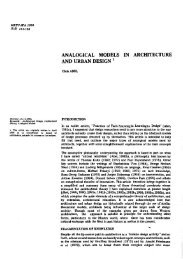INTERVIEW WITH ALISON AND PETER SMITHSON - Journal of the ...
INTERVIEW WITH ALISON AND PETER SMITHSON - Journal of the ...
INTERVIEW WITH ALISON AND PETER SMITHSON - Journal of the ...
You also want an ePaper? Increase the reach of your titles
YUMPU automatically turns print PDFs into web optimized ePapers that Google loves.
<strong>INTERVIEW</strong> <strong>WITH</strong> <strong>SMITHSON</strong>S METU JFA 1989 73<br />
campus structure will only come through if it is sustained over a long period, so<br />
that <strong>the</strong> idea becomes clearer as it goes along. And I find at Bath that I can't<br />
produce any real influence on this process because fashions in university buildings<br />
arc as in o<strong>the</strong>r places. And <strong>the</strong>se people are very responsible and devoted to<br />
<strong>the</strong> university, <strong>the</strong>se are good people.<br />
AS: But all <strong>the</strong> more reason why <strong>the</strong> architects' department should all <strong>the</strong> time<br />
show a concern for <strong>the</strong> way <strong>the</strong> university is developing, and as it were, have a<br />
'doorstep project' that <strong>the</strong> students realize, that it brings a kind <strong>of</strong> reality, 'it could<br />
happen here', *would we really like it if. That kind <strong>of</strong> consciousness is necessary<br />
to be grown in <strong>the</strong> students. I also think that unless <strong>the</strong> architects take this kind<br />
<strong>of</strong> active role on <strong>the</strong>ir campuses <strong>the</strong>y won't learn how to deal with people, how<br />
to fight this consumerism. By pure chance we were asked to have ano<strong>the</strong>r look<br />
at one <strong>of</strong> our Team 10 documents, because somebody was wanting to do an<br />
academic exercise on it, and we had to bring it with us because we knew we had<br />
no o<strong>the</strong>r time. The piece that I was reading last night happened to be a Team 10<br />
discussion on consumerism, how difficult it was to deal with administrators and<br />
fight <strong>of</strong>f this sort <strong>of</strong> supermarket-culture that we are all involved in where <strong>the</strong>y<br />
say 'yes, but we've just seen something smashing somewhere and never mind <strong>the</strong><br />
old idea, let's do this because presumably where we saw it had an old idea that<br />
<strong>the</strong>y've just pushed aside'. Cities were nice in <strong>the</strong> old days. There were always old<br />
men who could remember <strong>the</strong> intention <strong>of</strong> why <strong>the</strong>y put <strong>the</strong> fountain <strong>the</strong>re, or<br />
why <strong>the</strong>y paved that street, and why <strong>the</strong>y didn't do something else, or who planted<br />
that tree in grandmo<strong>the</strong>r's day or something. Now this is all lost, largely because<br />
<strong>of</strong> <strong>the</strong> great number we are, but also because <strong>of</strong> <strong>the</strong>se really horrific pressures <strong>of</strong><br />
<strong>the</strong> 'McDonalds and Coca-Cola culture'.<br />
BG: Yes, but probably that is something we can't help, but you brought out<br />
certain issues where <strong>the</strong> architect can be helpful. In that respect you point out<br />
something: <strong>the</strong> architect is not simply a designer, <strong>the</strong> architect is more than that.<br />
He should go into <strong>the</strong> preparation <strong>of</strong> <strong>the</strong> design process, <strong>the</strong> design, <strong>the</strong> aftermaths<br />
<strong>of</strong> design and even <strong>the</strong> consequences <strong>of</strong> design should also be in a way dealt<br />
with by <strong>the</strong> architect. How could this effect architectural education? What sort<br />
<strong>of</strong> new measures should be <strong>the</strong>n located into architectural education?<br />
PS: That's a good question because it enables me to continue in a practical way...<br />
When we opened <strong>the</strong> new building for <strong>the</strong> School <strong>of</strong> Architecture in Bath, <strong>the</strong><br />
head <strong>of</strong> <strong>the</strong> School said 'We will have a two-day meeting', actually very like a<br />
Team 10 meeting, and he said 'We will call it Genesis', i.e., how <strong>the</strong> design process<br />
began, and it was fantastically good. A footnote on this is that we invited <strong>the</strong><br />
president <strong>of</strong> <strong>the</strong> University and <strong>the</strong> man I'm talking about, <strong>the</strong> registrar, and <strong>the</strong><br />
contractor, and <strong>the</strong> administrators in his department to this lecture, so <strong>the</strong>y<br />
would hear <strong>the</strong> genesis <strong>of</strong> <strong>the</strong> building <strong>the</strong>y had just finished, and what influenced<br />
it, and we had <strong>the</strong> person who worked on <strong>the</strong> concept <strong>of</strong> <strong>the</strong> university as a young<br />
man, someone who is now <strong>the</strong> boss <strong>of</strong> a firm was <strong>the</strong>n an assistant.<br />
AS: In his first job.<br />
PS: You know, <strong>the</strong> man that did Hook, did <strong>the</strong> University <strong>of</strong> Bath general plan;<br />
his assistant from <strong>the</strong> time: so he went through <strong>the</strong> arguments on which <strong>the</strong><br />
university plan had been based. We followed naturally on that, what happens<br />
twenty years later, how do you reinterpret. They invited o<strong>the</strong>r people (because<br />
we are a mixed school) an engineer came who worked on Piano's art gallery in<br />
America. He started in <strong>the</strong> same way, he said 'This woman',<br />
AS: Schlumberger.


